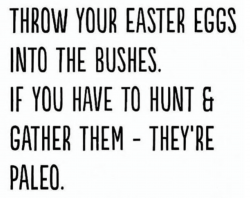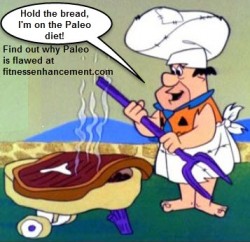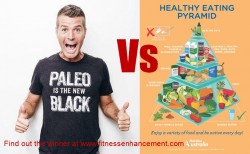 The Paleo Diet has now steamrolled its way into the mainstream world. Pop culture coverage of the so-called “Caveman Diet” pinnacled last week, after Channel 7’s Sunday Night interview with celebrity chef Pete Evans.
The Paleo Diet has now steamrolled its way into the mainstream world. Pop culture coverage of the so-called “Caveman Diet” pinnacled last week, after Channel 7’s Sunday Night interview with celebrity chef Pete Evans.
The program has received a considerable amount of criticism from the public—being accused of giving the My Kitchen Rules host a soapbox to stand on for the “blatant promotion” of his Paleo lifestyle. The controversy has raised a great deal of debate nationwide, and many of our clients have some valid questions regarding the topic. We’d like to take this opportunity to answer those questions, as well as dispel some of the myths surrounding Paleo and Pete Evan’s version of it.
What exactly does the Paleo Diet consist of?
If your cavemen ancestors didn’t eat it, you can’t either. In theory, Paleo followers consume a diet that consists of lean proteins (fish, poultry, eggs, grassfed red meat), seasonal fruits and vegetables, and healthy fats (nuts, seeds, avocados, olive oil, fish oil). “Off-limits” are any foods that can’t be hunted or gathered—processed foods, hydrogenated oils, alcohols, grains, sugar, breads, cereals, pastas… you get the picture. The rules become less clear-cut when you get to the dairy section of the food pyramid. Some Paleo advocates say it’s acceptable to consume raw, full-fat milk products and clarified butter. Others shun dairy completely. Another controversial food is the legume— many “hardcore” Paleo followers restrict beans, lentils and peanuts from their diet due to their arguably low nutritional value and tendency to disrupt digestive processes.
That sounds pretty healthy! What’s the downside to “going Paleo”?

Ever skipped a couple of meals and suddenly felt foggy and unable to concentrate? That’s because your brain needs glucose (aka carbohydrates) to perfor
m properly. A scientific study conducted by Johns Hopkins Medicine found that the average person needs to consume at least 130 grams of carbs a day in order to maintain optimum brain function. Most Paleo followers are limiting themselves to much less than that – perhaps that explains a thing or two about Pete Evan’s!
As any qualified or Nutritionist or Dietitian will tell you there’s also no logical reason to “ban” the entire food group of grains along with many other healthy and natural foods such as some fruits, legumes and potatoes (but sweet potato is considered healthy by Paleo advocates). You don’t need a professional to tell you that this doesn’t make sense, simply use your common sense. Australia didn’t get fat from too many slices of multi grain bread, and Asia as a whole is far leaner than western society despite the fact that rice (a grain banned by Paleo) is by far the most commonly consumed food. And even if bowl of rice was bad for you, whatever happened to the “everything is healthy in moderation” approach that we all know is so much better than a strict “diet”?
Another “small detail” that Paleo fans tend to overlook is the fact that our cavemen ancestors weren’t exactly prototypes of pristine health. The average lifespan of the Paleolithic Man was 3years—even less for a woman. They suffered from infectious diseases, parasites and even hardening of the arteries. And while it’s true that their diet emphasized protein consumption, anthropologists say it’s highly unlikely that it was chicken or beef they were chowing down on, and they certainly didn’t have a Pete Evans cook book. The caveman’s diet would have varied greatly by location, and contained a lot of small game (read: rodents), insects and tree bark. Even worse, caveman in many parts of the world were cannibals. So unless you’re sitting down to eat dinner plate full of rats, grubs and a serve of Grandma, you’re not truly imitating the prehistoric diet. Here’s a great article that further explains why Paleo is flawed.
It’s important to note that what’s being referred to as the “Paleo Diet” is actually touted as a “lifestyle”, which of course makes it even odder than that certain foods are “banned”. As far as weight loss is concerned, it’s not intended as a short-term crash diet to get you into that dress for your class reunion. There are no specified portion sizes—which may not be a problem if you’re consuming bowl after bowl of spinach, but if you’re downing a big packet of nuts every night, you won’t lose weight.
Can’t I pick and chose the bits of Paleo I like?
Absolutely you can! But that’s not Paleo, in the same way a vegetarian that eats steak isn’t a vegetarian! There’s plenty of great tasting and healthy Paleo food out there, but before it was dubbed “Paleo food” with any ingredient that was added in the 10,000 or so years ripped out of it, it was simply called “healthy, natural food”. If you want to copy how our ancestors ate, take the good bits from a little bit closer in the family tree and ask your grandparents. Odds are there was no McDonalds’s, no food with ingredients you can’t pronounce or understand what they are, heaps of natural home-made organic food, including freshly baked bread, and recreational time consisted of being active, not Playstation or Facebook! To ignore this and only look at what our Paelolithic great, great, great (plus another thousand greats) grandparents ate is about as logical as basing your diet on Kim Kardashian’s, as you do have more in common with her than Paleolithic man!
 If Paleo is supposed to be a “lifestyle”, why does Pete Evans gives us a 10-week diet?
If Paleo is supposed to be a “lifestyle”, why does Pete Evans gives us a 10-week diet?
Pete Evans promotes a “10-Week Activation Program”, designed to help you “transition easily to the Paleo lifestyle.” Well-respected journalist Mike Willesee gave the program a try, which is unfortunately a long way off what anyone would consider adequate research from a journalist. Viewers of Sunday Night were given the results of Willesee’s experience with the program—a weight loss of 5 kg and normalizing Homocysteine levels.
Mike Willesee’s positive results can likely be attributed to the fact that he stopped drinking 3 cans of coke a day (that’s 24 teaspoons of sugar), eating bad food and he began exercising. A 5kg weight loss and improved energy in 10 weeks is no different to the results we’ve gotten hundreds of clients over the years whilst eating plenty of healthy food that Pete Evan’s would put in the junk food list. Yet to get these results Mike Willesee had to follow a strict diet that by his own admission was difficult? We all know what happens in week 11 when someone finishes a restrictive 10 week diet that “bans” certain food!
Is Pete Evans a nutritional expert?
Pete Evans is a celebrity chef and TV host. His web site does claim that he has earned “qualifications from the Institute for Integrative Nutrition”, an online course that can be completed in less than a year and that has received criticism for its lack of science-based training. Even Integrative Nutrition doesn’t say Paleo is the best thing since sliced bread, and their website has plenty of mention of healthy food that is “banned” by Paleo lovers.
If Paleo isn’t the key to optimum health and weight loss, what is?
Fitness Enhancement promotes eating a healthy balanced diet and works in with Dietitian’s and Nutritionists who all share a similar view to us. We recommend a diet of whole foods that provides you with the energy necessary to build muscle and maintain physical activity. We agree that an avoidance of processed foods is a worthy goal, and that there are certain benefits obtained by adhering to a lower carb diet. However, it is our belief that the Paleo diet is unrealistic and unsustainable for the majority of people to commit to long-term. Success in maintained weight loss and improved health will be more likely if you view Paleo as a healthy direction, rather than a meal plan blueprint.

 The Paleo Diet has now steamrolled its way into the mainstream world. Pop culture coverage of the so-called “Caveman Diet” pinnacled last week, after Channel 7’s Sunday Night interview with celebrity chef Pete Evans.
The Paleo Diet has now steamrolled its way into the mainstream world. Pop culture coverage of the so-called “Caveman Diet” pinnacled last week, after Channel 7’s Sunday Night interview with celebrity chef Pete Evans.